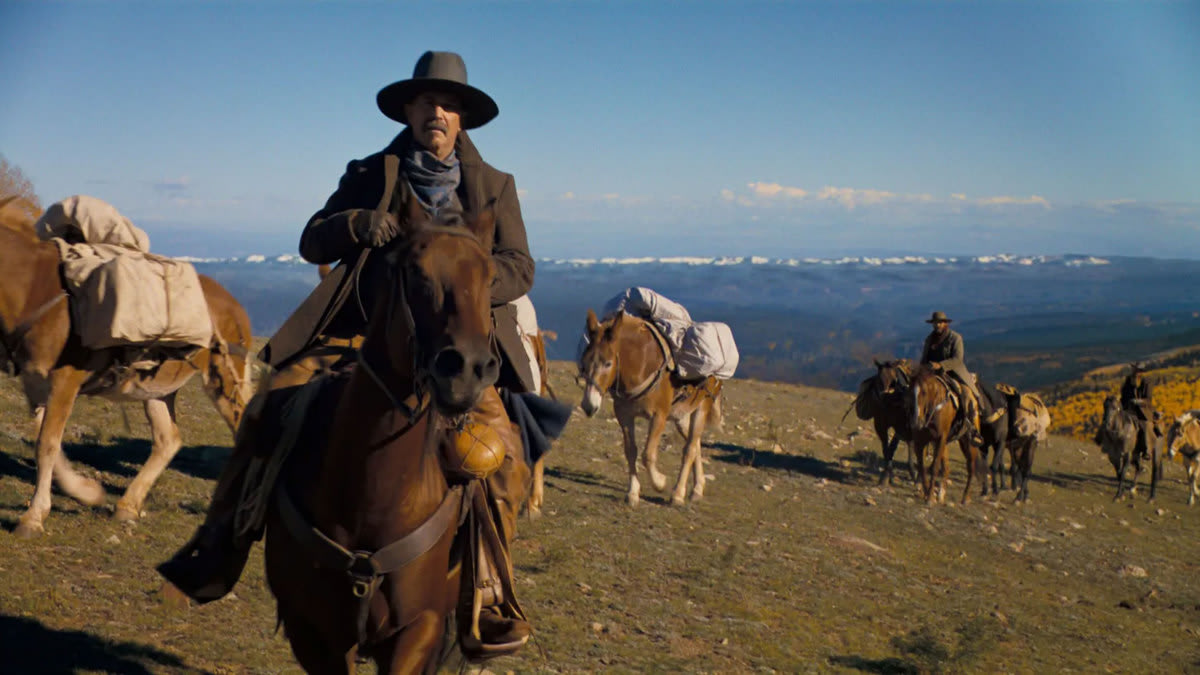Kevin Costner's 'Horizon' Review: A Misogynistic, Racist Mess
Kevin Costner mortgaged his house to make this three-part saga. “Chapter 1” premiered at Cannes, and is an interminable, confusing, and somewhat offensive disaster.

Updated May 21, 2024 3:41AM EDT / Published May 20, 2024 12:59PM EDT
Cannes Film Festival
Early on into the three hours of viewing Kevin Costner’s Horizon: An American Saga—Chapter 1 I thought back to last year’s Cannes Film Festival, where I saw Martin Scorsese’s Killers of the Flower Moon for the first time. That brilliant movie is a full throated condemnation of the genocide of Native Americans by white people who claim the U.S. as their own. Horizon is not that.
Instead, one of the inciting incidents in the unwieldy film that Costner directs is a violent Apache assault on a settlement. The mostly white settlers are portrayed as terrified innocents. Sienna Miller’s Frances hides beneath her house with her similarly blonde daughter (Georgia MacPhail) while her husband and son are murdered. They are shot in beatific fashion, meanwhile, the Native American assailants are shadowy figures who attack unprovoked. There are nods to nuance that come later, but far too little in the first part of Costner’s passion project, which debuted at the festival.
Everything about Horizon is retrograde. Men are noble heroes (like Hayes Ellison, the drifter played by Costner), or brutes who toss around the women, themselves either saintly like Miller or frivolous and nagging. Even the score from John Debney, with its sweeping strings, feels like it was piped in the ’90s. But Costner was better in that era—there’s more nuance in Dances with Wolves than there is here.
But the biggest problem with Horizon is that, even with its lengthy running time, Costner has only scratched the surface of the “saga” he’s trying to tell. There is no arc to what happens, just the seemingly unending introduction of characters. Chapter 1 doesn’t end. Rather it just trails off into a clip reel of what’s to come like one of those “this season on…” promos that comes at the beginning of a television show. That montage at least depicts how some of the disparate threads will collide. It finishes, however, on a shot of Giovanni Ribsi’s face as a character we have yet to meet, a befuddling choice.
Horizon doesn’t even feel like three episodes of an hour-long drama, because those usually tell some sort of complete story. This just feels like fragments, during which it is impossible to tell how much time has passed.
So what is Horizon, which Costner co-wrote with Jon Baird, about? Well, too many things. But to put it simply, it’s about a bunch of people in the American West in the 1860s in the piece of land in the San Pedro Valley deemed “Horizon.” There’s the Miller storyline, in which she and her daughter are taken in following the destruction of their camp at Horizon by a group of kindly Union soldiers, including Sam Worthington as First Lt. Trent Gephardt, with whom we will eventually see her have a romantic relationship. Some of the survivors, meanwhile, go off to seek revenge, which starts to weigh on a small boy.
Costner shows up about an hour in as Hayes, who runs into the promiscuous Marigold (Abbey Lee), who is forced to take care of a child when the enemies of the kid’s mother (Jena Malone) arrive in town. (One of the most mortifying scenes involves Lee’s character mounting Costner’s saying she's going to help him go to sleep by having sex with him.)
There is, separate from all of this, a bit about a group of pioneers in covered wagons in Western Kansas. They are led by Luke Wilson’s Matthew Van Weyden, who has to deal with some fussy Brits played by Ella Hunt and Tom Payne. We also briefly meet an Apache played by Tatanka Means. I assume he will have more to do later, which is also what I can say for most everyone on screen.
The lack of conclusion for any of the characters—except for the ones who die—make it almost impossible to evaluate Horizon without caveats. But at the same time, it is punishing to ask audiences to invest this much time in a theater, especially given that there are apparently three more parts coming. The first two are due to be released this summer, with Chapter 1 in June and Chapter 2 in August.
I’m not sure why Costner didn’t turn this into the television project it so wishes to be. Perhaps he just wanted to one up Yellowstone, the wildly popular Taylor Sheridan show, on which he played John Dutton, and which he decided to leave. But as a cinematic experience it is aggravating in multiple ways. If you’re not mad at how offensively backward it all is, you’ll be pissed about all the stage setting.









































